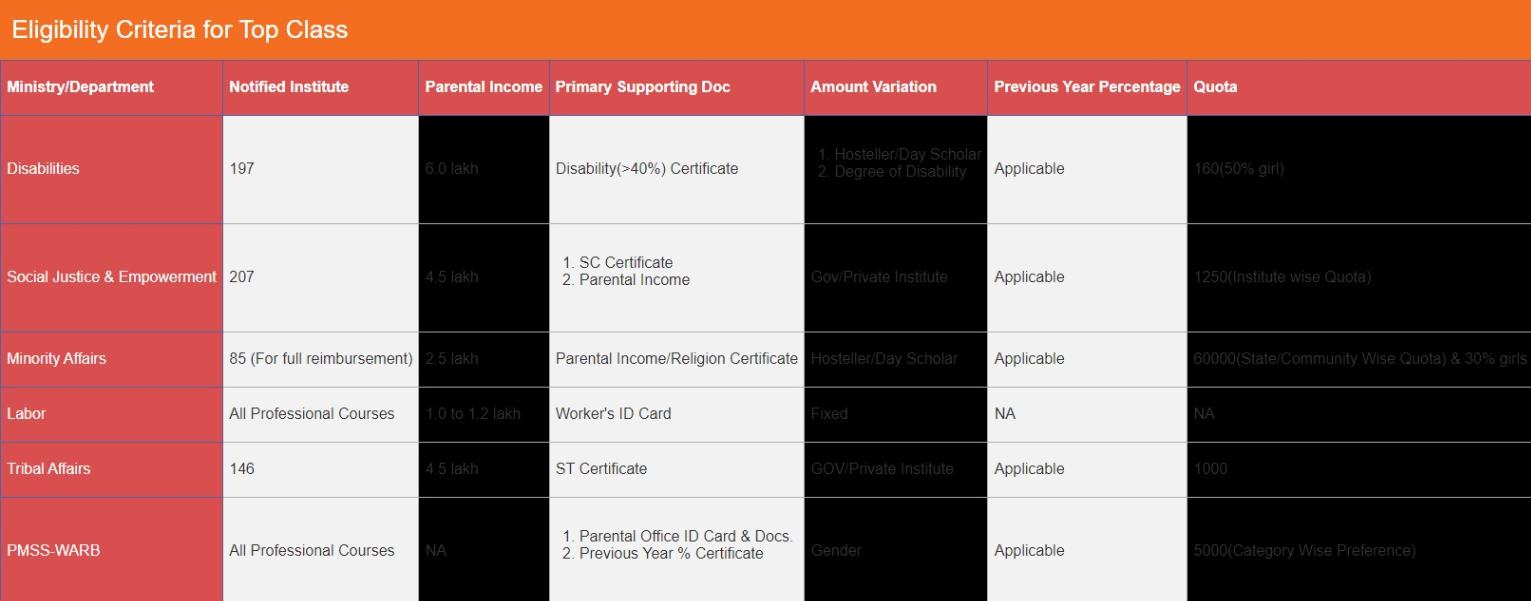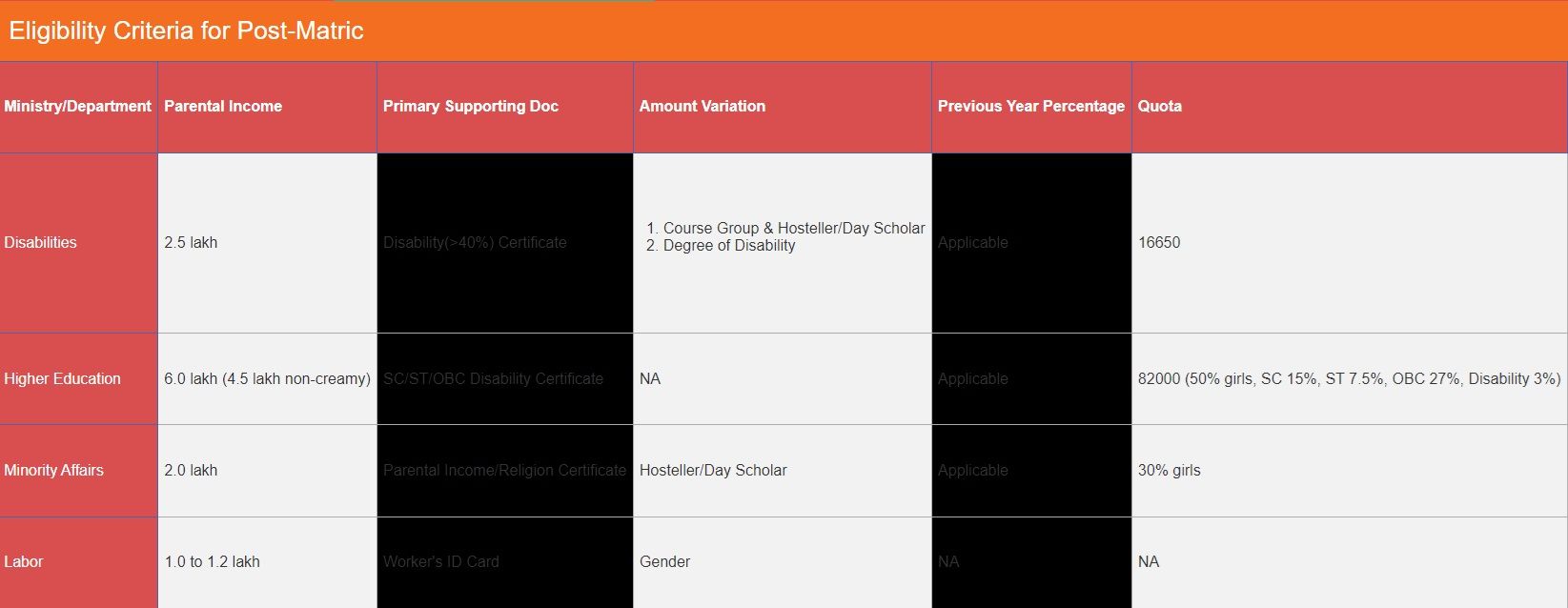National Scholarship Portal Annual Income Limit for top class, post-matric and pre-matric scholarship is provided in this article below.
The National Scholarship Portal (NSP) serves as a pivotal platform in India, offering a wide array of scholarships to students across various levels of education. One of the key determinants for eligibility in these scholarships is the annual income limit, which acts as an important criterion in assessing an applicant’s qualification for financial assistance. The income limit often defines the economic threshold that students or their families must fall under to avail themselves of these scholarships.
Role in Scholarship Disbursement
The imposition of annual income limits on the NSP ensures that scholarships are directed towards those who genuinely need financial support for their education. It aims to assist students coming from economically weaker backgrounds, enabling them to pursue their academic aspirations without being hindered by financial constraints.
Types of Scholarships and Varied Income Criteria
The NSP encompasses a range of scholarships catering to diverse educational levels, such as pre-matric, post-matric, and higher education. Each scholarship often comes with its specific income limit criteria, tailored to suit the respective target group and their financial needs.
- Pre-Matric Scholarships: These scholarships cater to students from Class 1 to 10 and often have different income limits set by the respective departments or ministries offering them. For instance, income limits may vary between the Disability Ministry, Minority Affairs, or Labor Department scholarships.
- Post-Matric Scholarships: Geared towards students pursuing studies after matriculation, these scholarships again entail varying income limits based on the department offering them. The Disabilities Ministry, Higher Education, Minority Affairs, and Labor Department scholarships under the NSP often have distinct income criteria.
- Higher Education Scholarships: Scholarships for higher education encompass undergraduate and postgraduate levels, often designed with specific income brackets. These scholarships, offered through NSP, might have different income limits to cater to different sections of society, like SC/ST/OBC students or those with disabilities.
National Scholarship Portal Annual Income Limit
The NSP Scholarship annual income limit for all ministries is presented below criteria-wise.
NSP Scholarship Top Class Scholarship – Parental Income Criteria
The NSP Top Class Scholarship program has specific parental income criteria set by different ministries/departments to determine eligibility.
For individuals with disabilities, the threshold is a parental income of 6.0 lakh. In the realm of Social Justice & Empowerment, applicants must have a parental income not exceeding 4.5 lakh to qualify for the scholarship.
The criteria set by the Ministry of Minority Affairs is a parental income limit of 2.5 lakh.
The Labor Department has a range for eligibility, requiring a parental income falling between 1.0 to 1.2 lakh. Lastly, the Tribal Affairs Ministry has established a parental income threshold of 4.5 lakh for prospective scholarship recipients.
These varying income criteria reflect the diverse considerations and priorities of different ministries in ensuring that deserving candidates receive financial support through the Top Class Scholarship program. Further details related to this is provided in tabular format below.
| Ministry/Department | Parental Income |
|---|---|
| Disabilities | 6.0 lakh |
| Social Justice & Empowerment | 4.5 lakh |
| Minority Affairs | 2.5 lakh |
| Labor | 1.0 to 1.2 lakh |
| Tribal Affairs | 4.5 lakh |
| PMSS-WARB | NA |
NSP Scholarship Post-Matric Scholarship – Parental Income Criteria
The NSP Post-Matric Scholarship program outlines specific parental income criteria across various ministries and departments to determine eligibility for financial assistance. Individuals with disabilities are eligible for the scholarship if their parental income does not exceed 2.5 lakh.
In the context of Higher Education, the criteria are set at 6.0 lakh, with a distinction made for non-creamy layer candidates who must have a parental income not exceeding 4.5 lakh.
The Ministry of Minority Affairs has established a parental income limit of 2.0 lakh for prospective scholarship recipients. Additionally, the Labor Department has a range for eligibility, requiring a parental income falling between 1.0 to 1.2 lakh.
Further details are provided below:
| Ministry/Department | Parental Income |
|---|---|
| Disabilities | 2.5 lakh |
| Higher Education | 6.0 lakh (4.5 lakh non-creamy) |
| Minority Affairs | 2.0 lakh |
| Labor | 1.0 to 1.2 lakh |
NSP Scholarship Pre-Matric Scholarship – Parental Income Criteria
The National Scholarship Portal (NSP) Pre-Matric Scholarship program has established specific parental income criteria across various ministries and departments to determine eligibility for financial support.
For individuals with disabilities, the threshold is set at a parental income of 2.0 lakh. The Ministry of Minority Affairs has defined a parental income limit of 1.0 lakh for prospective scholarship recipients.
The Labor Department specifies a range for eligibility, requiring a parental income falling between 1.0 to 1.2 lakh.
Furthermore, the School Education Department has set the criteria at a parental income not exceeding 1.5 lakh for students to qualify for the Pre-Matric Scholarship. Check all important details below in tabular format.
| Ministry/Department | Parental Income |
|---|---|
| Disabilities | 2.0 lakh |
| Minority Affairs | 1.0 lakh |
| Labor | 1.0 to 1.2 lakh |
| School Education | 1.5 lakh |
Also Read About:
- New NSP Registration
- Fill NSP Institute Registration Form
- How to do NSP Biometric Authentication?
- NSP School/Institute Login
- NSP Helpline Number
- NSP Renewal Application
- National Scholarship Portal Login
- National Scholarship for PG Students
- Recover Forgotten NSP Application ID?
- National Scholarship for Disabled Students
- Check NSP Scholarship Status
National Scholarship Portal Annual Income Limit: Eligibility Criteria
The eligibility criteria for all class scholarships are mentioned below:
NSP Scholarship Eligibility Criteria for Top Class
The National Scholarship Portal (NSP) outlines the eligibility criteria for the Top Class Scholarship across various ministries and departments. For individuals with disabilities, submission of a Disability Certificate (>40%) is the primary supporting document. The scholarship amount varies based on the applicant’s status as a Hosteller or Day Scholar, and the degree of disability is taken into consideration.
Under the Social Justice & Empowerment Ministry, the person has to provide the SC Certificate as the primary supporting document.
For Minority Affairs, it requires the submission of either the Parental Income Certificate or Religion Certificate. The scholarship is applicable to both Hostellers and Day Scholars.
The Labor Department extends the scholarship to all professional courses, with a parental income range of 1.0 to 1.2 lakh and the Worker’s ID Card as the primary supporting document. The scholarship amount is fixed.
Other details related to the NSP Scholarship eligibility criteria is provided below in a tabular format.
| Ministry/Department | Notified Institute | Parental Income | Primary Supporting Doc | Amount Variation |
| Disabilities | 197 | 6.0 lakh | Disability (>40%) Certificate | Hosteller/Day Scholar Degree of Disability Applicable |
| Social Justice & Empowerment | 207 | 4.5 lakh | SC Certificate Parental Income Gov/Private Institute Applicable | 1250 (Institute wise Quota) |
| Minority Affairs | 85 (For full reimbursement) | 2.5 lakh | Parental Income/Religion Certificate | Hosteller/Day Scholar Applicable |
| Labor | All Professional Courses | 1.0 to 1.2 lakh | Worker’s ID Card | Fixed |
| Tribal Affairs | 146 | 4.5 lakh | ST Certificate GOV/Private Institute Applicable | 1000 |
| PMSS-WARB | All Professional Courses | NA | Parental Office ID Card & Docs. Previous Year % Certificate Gender Applicable | 5000 (Category Wise Preference) |
NSP Scholarship Eligibility Criteria for Post-Matric
The eligibility criteria for the National Scholarship Portal (NSP) Post-Matric Scholarship program vary across ministries and departments, each with specific requirements. For individuals with disabilities, the Disabilities Ministry sets a parental income limit of 2.5 lakh. Applicants must submit a Disability Certificate (>40%) as the primary supporting document, and the scholarship amount varies based on the course group, hostel status (Hosteller/Day Scholar), and the degree of disability.
In the realm of Higher Education, the eligibility criteria established by the corresponding ministry include a parental income not exceeding 6.0 lakh (4.5 lakh for non-creamy layer candidates). The primary supporting document is the SC/ST/OBC Disability Certificate, and the scholarship is applicable to all.
For Minority Affairs, individuals with a parental income limit of 2.0 lakh are eligible. The primary supporting documents include either the Parental Income Certificate or the Religion Certificate. The scholarship is applicable for both Hostellers and Day Scholars, with a specific quota allocating 30% to girls.
The Labor Department extends eligibility to those with a parental income ranging from 1.0 to 1.2 lakh. The primary supporting document is the Worker’s ID Card, and gender is considered as a criterion. Specific details regarding the scholarship amount variation, previous year percentage, and quota are not provided for this category.
All other important details related to this is provided below:
| Ministry/Department | Parental Income | Primary Supporting Doc | Amount Variation | Previous Year Percentage | Quota |
|---|---|---|---|---|---|
| Disabilities | 2.5 lakh | Disability (>40%) Certificate | Course Group & Hosteller/Day Scholar Degree of Disability Applicable | 16650 | |
| Higher Education | 6.0 lakh (4.5 lakh non-creamy) | SC/ST/OBC Disability Certificate | NA | Applicable | 82000 (50% girls, SC 15%, ST 7.5%, OBC 27%, Disability 3%) |
| Minority Affairs | 2.0 lakh | Parental Income/Religion Certificate | Hosteller/Day Scholar | Applicable | 30% girls |
| Labor | 1.0 to 1.2 lakh | Worker’s ID Card | Gender | NA | NA |
NSP Scholarship Eligibility Criteria for Pre-Matric
The eligibility criteria for the National Scholarship Portal (NSP) Pre-Matric Scholarship program are delineated by various ministries and departments, each with specific requirements. For individuals with disabilities, the Disabilities Ministry sets a parental income limit of 2.0 lakh. Applicants are required to submit a Disability Certificate (>40%) as the primary supporting document.
Under the Minority Affairs Ministry, candidates with a parental income not exceeding 1.0 lakh are eligible. The primary supporting documents include either the Parental Income Certificate or Religion Certificate.
In the School Education category, individuals with a parental income not exceeding 1.5 lakh are eligible. The primary supporting document is the Parental Income Certificate, and eligibility may be determined through a written test.
Further details related to the NSP scholarship eligibility criteria for the Pre-matric category are provided below in tabular format.
| Ministry/Department | Parental Income | Primary Supporting Doc | Amount Variation | Previous Year Percentage | Quota |
|---|---|---|---|---|---|
| Disabilities | 2.0 lakh | Disability (>40%) Certificate | Hosteller/Day Scholar Degree of Disability | 46000 | Applicable |
| Minority Affairs | 1.0 lakh | Parental Income/Religion Certificate | Hosteller/Day Scholar | Applicable | 30% girls |
| Labor | 1.0 to 1.2 lakh | Worker’s ID Card | Gender | NA | NA |
| School Education | 1.5 lakh | Parental Income Written Test | NA | Applicable | 100000 |
Implications of Income Limits
Ensuring Fair Distribution
By establishing income limits, the NSP strives to distribute scholarships equitably among those who need it the most. This approach aims to prevent affluent or financially stable students from accessing scholarships meant for economically disadvantaged sections, thereby channeling resources more effectively.
Promoting Inclusivity
Setting income limits encourages inclusivity by providing opportunities for education to those who might otherwise be deprived due to financial constraints. It aims to bridge the gap between different socio-economic segments, fostering a more inclusive educational landscape.
Conclusion
The National Scholarship Portal’s annual income limit criteria play a pivotal role in ensuring fair and targeted disbursement of scholarships. By delineating economic thresholds, these limits aim to support students from economically weaker backgrounds, enabling them to pursue education without undue financial strain. This approach aligns with the broader goal of promoting educational inclusivity and equity across various levels of academia.



